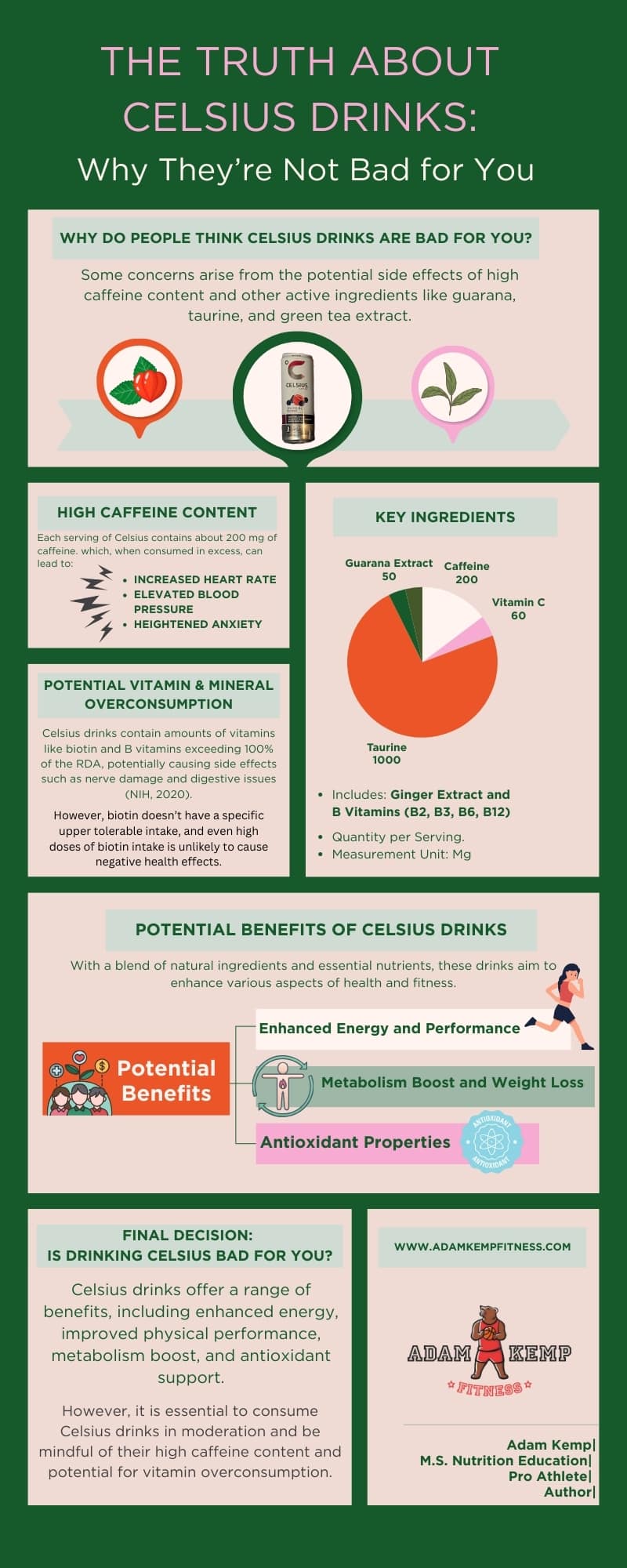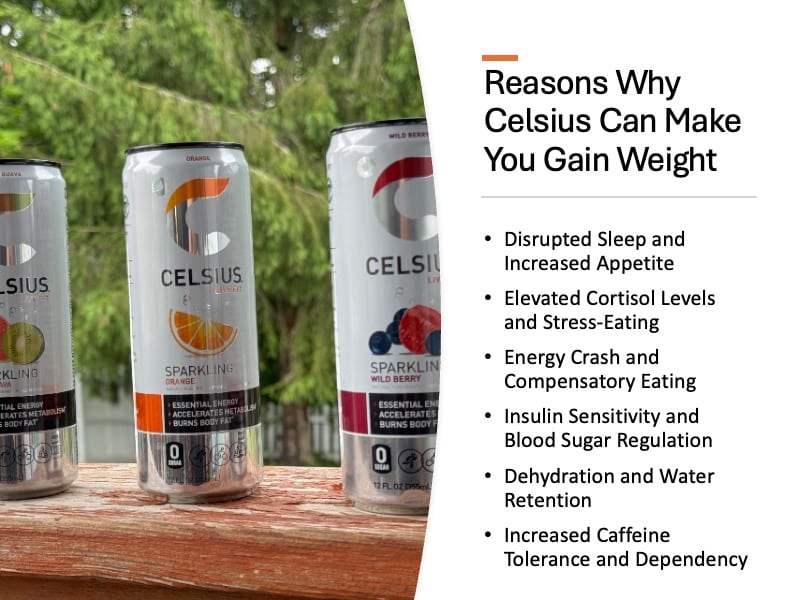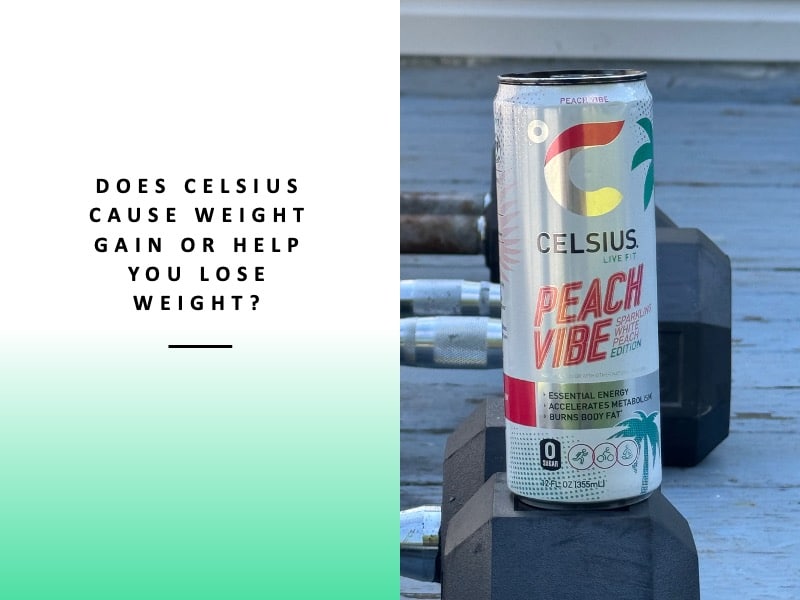Does Celsius Cause Weight Gain? Analyzing the Claims
With the popularity of Celsius drinks skyrocketing, many people are asking, “Does Celsius cause weight gain?”
Marketed as one of the healthiest energy drinks available, Celsius promotes itself as a thermogenic aid that boosts calorie burning through key ingredients like caffeine, EGCG (epigallocatechin gallate), green tea extract, guarana, and ginger.
These compounds are often associated with elevated energy, improved fat oxidation, and increased workout performance, and I’ve consumed Celsius drinks consistently over the last few years.
Based on my experience, Celsius drinks can be beneficial for increasing energy, burning fat, and supporting body composition goals, especially when combined with a well-balanced diet and a training plan.
However, as with any stimulant-based supplement, there are potential downsides when consumed in excess or without consideration of other lifestyle factors.
For example, regularly consuming Celsius too late in the day can interfere with sleep quality.
Chronic poor sleep is linked to increased ghrelin (hunger hormone), reduced leptin (satiety hormone), and elevated cortisol—all of which can encourage fat gain over time.
Additionally, overreliance on stimulants may lead to symptoms of adrenal fatigue, energy crashes, or compensatory eating behaviors that sabotage weight loss progress.
While Celsius can help you lose weight and give you an energy boost when used strategically, it’s not a magic bullet and improper use can unintentionally contribute to weight gain over time.
This guide breaks down Celsius ingredients and real-world usage to determine whether Celsius can cause weight gain or support your weight loss goals.
Celsius Drinks Ingredients & Nutrition Facts

To understand whether Celsius can cause weight gain or support fat burning, it’s essential to look beyond marketing claims and analyze the actual ingredients inside each can.
Celsius is marketed as a zero-sugar, low-calorie energy drink packed with metabolism-boosting compounds, vitamins, and plant extracts.
Each ingredient plays a role in how your body processes energy, burns fat, or, if misused, potentially contributes to unwanted weight gain.
With only 10–15 calories per can and no added sugars, Celsius is unlikely to create a calorie surplus on its own.
However, its high caffeine content and stimulatory ingredients can affect appetite, sleep, stress, and energy balance—making it important to understand how each component impacts your metabolism and weight over time.
Vitamins and Minerals
Natural Flavors and Beta-Carotene
These ingredients add taste and color. Beta-carotene also acts as an antioxidant, promoting overall health.
Green Tea (EGCG)
Green tea extract can boost metabolism and aid in fat burning by promoting thermogenesis, which helps with weight management.
Green tea extract in Celsius contains EGCG (epigallocatechin gallsate), a compound shown to promote fat oxidation during physical activity (Hursel et al., 2009).
This combination of EGCG with caffeine may work synergistically to increase energy expenditure further.
Although green tea extract can help you lose weight, the effect varies between individuals based on factors like genetic predisposition and caffeine tolerance.
While it may not lead to significant fat loss, it can support a modest reduction in body fat when paired with regular exercise and a nutritious diet.
Guarana
Guarana is a plant-based stimulant included in Celsius due to its high caffeine content, which is even more concentrated than that of coffee beans.
Studies indicate that caffeine can temporarily boost metabolic rate by increasing thermogenesis—the process of heat production in the body, which can lead to increased calorie burning (Astrup et al., 1990).
While caffeine-induced thermogenesis may not lead to drastic weight loss, it can support a small increase in calorie expenditure, which, combined with a balanced diet and exercise, may aid weight management rather than cause weight gain.
While the caffeine in Celsius is often associated with temporary appetite suppression and increased energy expenditure, overconsumption can ironically lead to weight gain through a few key physiological and behavioral pathways.
Using caffeine in moderation, combined with healthy lifestyle habits, helps minimize these risks and supports overall well-being.
It provides a smooth, sustained energy lift that can improve physical and mental performance without the typical crash associated with synthetic stimulants.
As a thermogenic compound, guarana may support metabolism and fat oxidation, helping to increase calorie expenditure during workouts or daily activities.
When used in moderation, guarana is unlikely to contribute to weight gain and may support energy balance.
Ginger
Ginger root extract is another key ingredient in Celsius, valued for its anti-inflammatory and digestive health benefits.
Ginger has been studied for its potential to stabilize blood sugar levels, which may reduce cravings and improve appetite control.
By promoting satiety and improving insulin sensitivity, ginger can be a supportive ingredient for weight management.
In the moderate amounts found in Celsius, ginger is unlikely to contribute to weight gain and may help regulate eating behaviors when included in a balanced routine.
Taurine
Taurine is a naturally occurring amino acid-like compound that plays a key role in cardiovascular function, electrolyte balance, and muscle contraction. In the context of
Celsius, taurine supports exercise performance by improving muscular endurance, reducing fatigue, and improving recovery.
While it does not directly influence fat burning or metabolism, taurine may indirectly support weight management by enabling more effective and sustained workouts.
Additionally, some research suggests taurine has antioxidant and anti-inflammatory properties, which can support overall health during periods of intense physical stress.
It does not contribute calories or affect insulin levels, making it a safe ingredient for those focused on body composition and weight control.
Sucralose
Sucralose is the primary artificial sweetener used in Celsius to provide a sweet flavor without adding calories or sugar.
While this keeps the drink low in calories, emerging research suggests that non-nutritive sweeteners, such as sucralose, may still impact appetite regulation and metabolic health.
Some studies suggest that artificial sweeteners may increase cravings for sweet or calorie-dense foods, potentially leading to higher overall caloric intake over time (Swithers, 2013).
Additionally, frequent consumption of sucralose may alter gut microbiota in ways that impair glucose tolerance, which could influence long-term weight management.
Although sucralose alone does not directly cause weight gain, its indirect effects on hunger signals, food preferences, and metabolic pathways may contribute to weight challenges for some individuals.
Can Celsius Make You Gain Weight?
Celsius is a low-calorie energy drink that contains no added sugars, making it a good option for those looking to manage their weight when consumed in moderation.
The drink is primarily composed of ingredients such as caffeine, taurine, and B vitamins, which can increase energy levels and boost metabolism.
However, consuming excessive amounts, particularly later in the day, can disrupt sleep patterns due to its caffeine content.
Disrupted sleep can lead to increased levels of cortisol, a hormone associated with stress and weight gain.
Elevated cortisol levels can lead to hormonal imbalances that not only increase appetite but also promote fat storage, particularly in the abdominal area.
For these reasons, while Celsius can be a guilt-free refreshment, moderation is key to avoiding potential negative effects on weight and overall health.
Reasons Why Celsius Drinks Could Contribute to Weight Gain

Celsius energy drinks are formulated with ingredients that target energy production and metabolism.
The core ingredients include caffeine, green tea extract, guarana, ginger root, and chromium, all of which are known for their potential to influence metabolic rate and energy expenditure.
Notably, Celsius is also free from sugar, artificial preservatives, and high-calorie additives, suggesting that it’s unlikely to directly contribute to weight gain.
Disrupted Sleep and Increased Appetite
High caffeine intake, especially later in the day, can interfere with sleep quality and duration. Poor sleep can disrupt hormone levels, particularly increasing ghrelin (the hunger hormone) and decreasing leptin (the hormone signaling fullness).
Studies have shown that sleep-deprived individuals tend to consume more calories, often craving higher-fat and sugary foods as a quick energy source (Taheri et al., 2004).
The cycle of poor sleep and increased hunger can easily lead to overeating and weight gain over time.
Elevated Cortisol Levels and Stress-Eating
Caffeine stimulates the adrenal glands, prompting the release of cortisol—a stress hormone. In small doses, this can improve alertness; however, chronic caffeine overuse may elevate baseline cortisol levels, leading to a stress response.
Elevated cortisol can trigger cravings for high-calorie, carbohydrate-rich comfort foods, which can promote weight gain if eaten in excess (Epel et al., 2001).
Additionally, prolonged high cortisol levels have been associated with increased fat storage, particularly around the abdomen.
Energy Crash and Compensatory Eating
Caffeine provides a short-term boost by stimulating the central nervous system, but this energy spike is often followed by a crash, especially when consumed in large quantities.
During this low-energy phase, individuals may compensate by eating more, particularly sugary or high-carb foods, to recover their energy levels quickly.
This pattern of fluctuating energy levels and compensatory eating can lead to increased caloric intake and potential weight gain.
Insulin Sensitivity and Blood Sugar Regulation
Excessive caffeine intake may impair insulin sensitivity, making it harder for the body to regulate blood sugar levels effectively.
Poor insulin sensitivity can lead to higher circulating blood glucose, promoting fat storage and increasing cravings for sugary foods to balance perceived energy dips.
Over time, impaired insulin sensitivity can make it easier to gain weight, especially when combined with frequent sugar-rich snack intake.
Dehydration and Water Retention
Caffeine acts as a diuretic, causing increased urination and potential dehydration if fluids aren’t adequately replenished.
In response, the body may retain water, leading to temporary weight gain due to water retention.
Additionally, dehydration can sometimes be mistaken for hunger, prompting increased food intake instead of fluid replenishment, further increasing calorie consumption.
Increased Caffeine Tolerance and Dependency
Frequent caffeine consumption builds tolerance, requiring higher amounts to achieve the same energy boost.
This can lead to excessive caffeine intake, perpetuating sleep, appetite, and stress-related issues that indirectly promote weight gain.
Furthermore, relying on caffeine as a primary energy source can also lead to neglecting other health-supportive habits, like regular balanced meals and exercise, which are essential for weight management.
Final Thoughts: Does Celsius Really Make You Gain Weight?

Based on its ingredients and low-calorie content, Celsius drinks are unlikely to directly cause weight gain, and I believe it is the best energy drink for weight loss.
The drink’s thermogenic ingredients, such as caffeine and green tea extract, may help increase calorie expenditure modestly, and its lack of added sugars prevents it from contributing to excess calorie intake.
However, excessive reliance on energy drinks like Celsius, without a balanced diet, sufficient sleep, and hydration, may lead to indirect lifestyle habits that counteract weight loss goals.
For individuals seeking to manage their weight effectively, Celsius can be a useful addition to a health-conscious routine, providing an energy boost without significant calories.
However, its effectiveness will ultimately depend on the user’s overall lifestyle, diet, and exercise habits, making it a supportive tool rather than a standalone solution for weight management.
For those who enjoy Celsius drinks, the on-the-go Celsius packets are a convenient and cost-effective option.
These packets offer the same thermogenic benefits as the canned drinks but with greater portability and a lower price per serving, making them an ideal choice for anyone incorporating Celsius into their daily routine.
Last update on 2025-06-14 / This article includes affiliate links/Images via Amazon Product Advertising API. I may earn commissions on purchases made through these links.
Frequently Asked Questions About Celsius and Weight Gain
Read Next: Does Celsius Burn Fat?
This website does not provide medical advice. This website site does contain affiliate links, and purchases may earn a commission.
Read my Medical Disclaimer, Review Disclaimer, and Publishing Policies for more details. Use of this site indicates acceptance of these terms.




